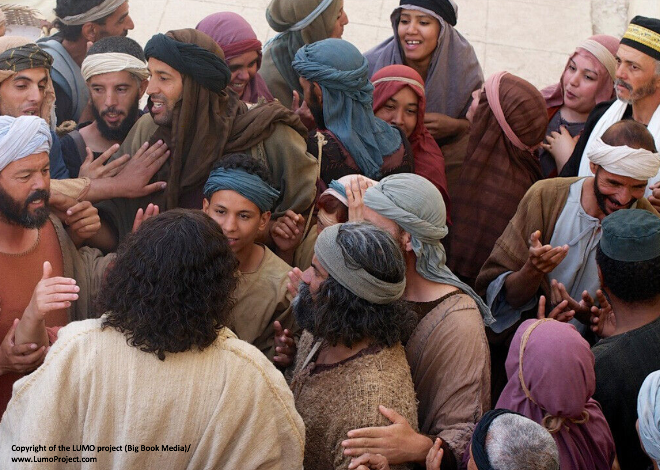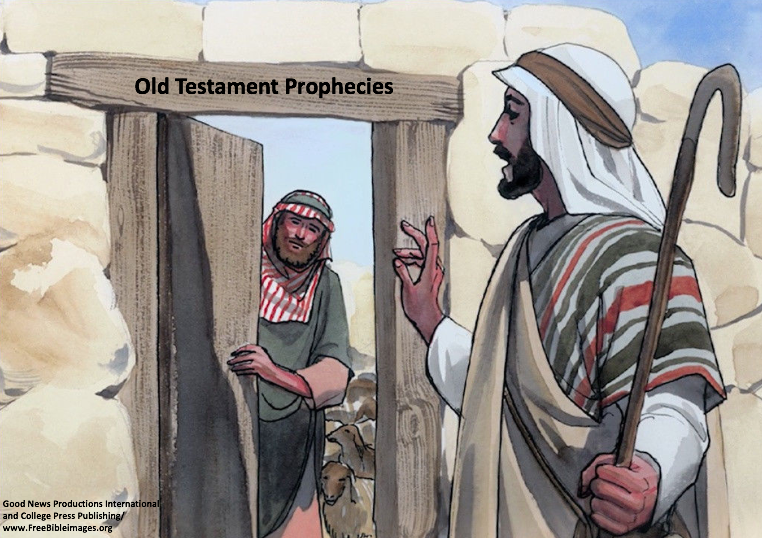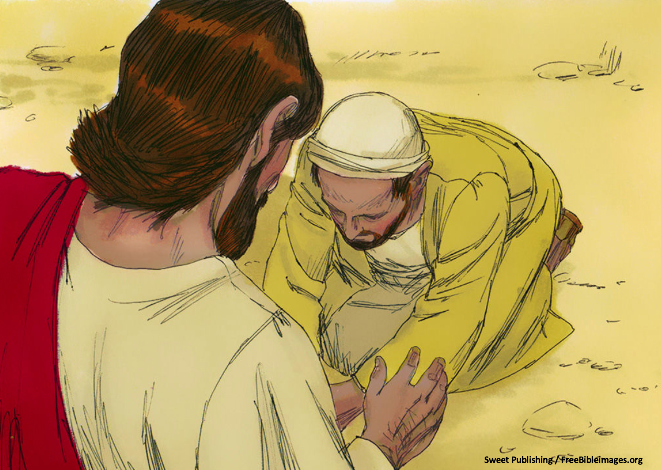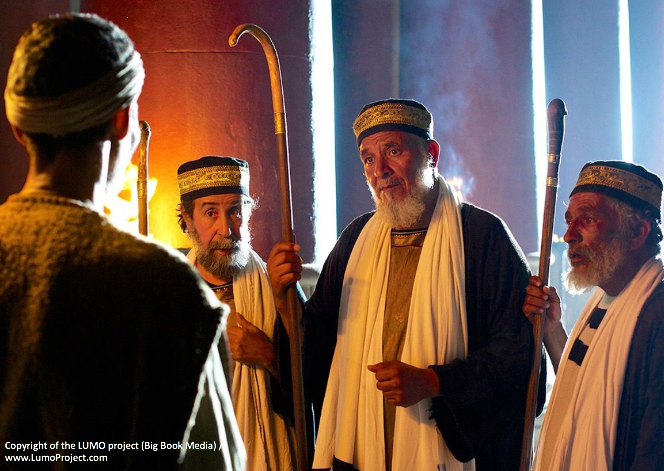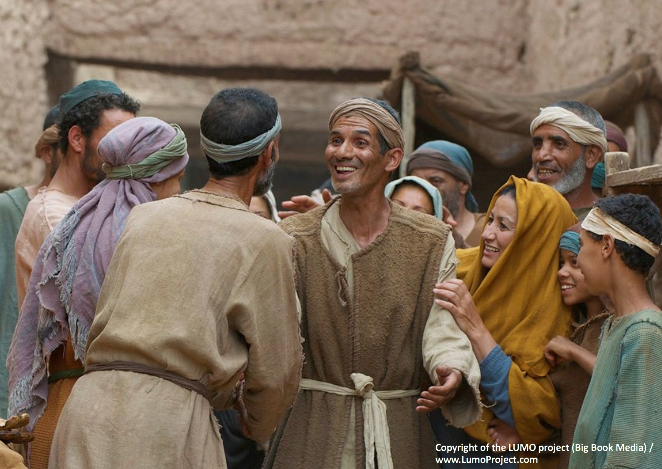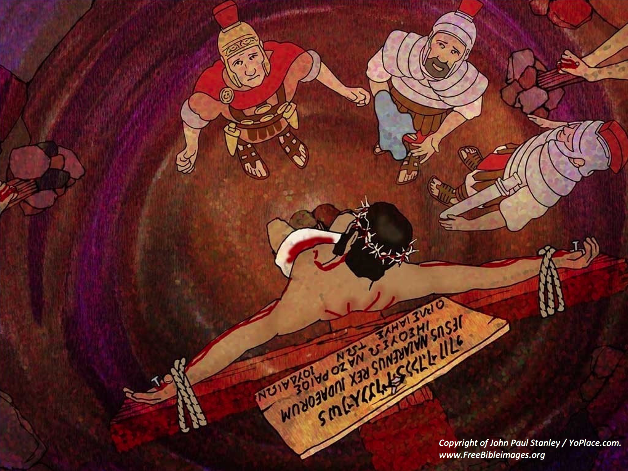“Therefore there was a division again among the Jews because of these sayings.” John 10:19
The final way in this passage that we can also grow closer to the Good Shepherd is when we IMPART A CONSISTENT AND CLEAR WITNESS TO THE LOST ABOUT CHRIST (John 10:19-21). Jesus’ claims to be the Messianic Shepherd of Israel received a mixed response from His Jewish audience (John 10:1-18). “Therefore there was a division again among the Jews because of these sayings.” (John 10:19). Because of what Jesus taught about being Israel’s Messianic Shepherd and yet dying for His sheep, His audience continued to be divided over Him. In the mind of the average Jew this was a contradiction. The Israelites expected a political Messiah to deliver them from political oppression, but Jesus came to be a spiritual Messiah to deliver them from the penalty of sin. The people rejected Christ because He did not live up to their expectations.
Even Christians can succumb to a similar kind of thinking that says if you are following Christ, you will have fewer problems and less suffering. In fact, believers may be quick to reject other believers who are suffering or display weaknesses because of this false expectation.
“And many of them said, “He has a demon and is mad. Why do you listen to Him?” (John 10:20). Some of Jesus’ listeners concluded that He “has a demon and is mad” or insane to say such things! They questioned why anyone would “listen” to such a man. His teachings seemed unreasonable and impossible to them.
Yet others were impressed with what Jesus was saying. “Others said, ‘These are not the words of one who has a demon. Can a demon open the eyes of the blind?’ “ (John 10:21). Christ’s gracious teaching did not resemble that of a demon nor did His miraculous healing of the man born blind (John 9:1-41). This group says what Jesus is not but they make no attempt to say who Christ is.
Throughout his gospel, John emphasizes the two opposite conclusions that people draw from Jesus’ teaching, even though Christ’s witness to His identity as God was sufficiently consistent and clear. This should be an encouragement to all Christians who tell others the truth about Christ. Not even Jesus Himself convinced everyone that He was God’s Son. When believers openly identify with Christ by telling others who He is and what He has done for them, they can experience a closer relationship with Him regardless of how others respond to the message. After all, Jesus is our Good Shepherd Who has entrusted us with His Good News (gospel) to share with others. As we proclaim this good news to others, we are also proclaiming it to ourselves. And in a world that is filled with bad news these days, it does our souls good to hear the good news of our Good Shepherd! And let’s remember that as disciples of Christ, our responsibility is to be clear and consistent in our witness for Christ to the lost; however, it is Jesus’ responsibility to save them.
It is also true that the lies of the Devil can keep believers from being a consistent and clear witness to the gospel of Christ. After all, Satan is “the father of lies” (John 8:44). In EvanTell’s Evangelism Study Bible, it reads, “He [Satan] misrepresented what God said to Eve since only one tree was off limits (see Gen. 2:16-17; 3:11). He even cast doubt over God’s character, implying that God would hold back what was best for them (see Gen. 3:4-5).
“Satan still uses lies to hinder believers in evangelism today. Here are five he commonly uses:
“1. ‘Non-Christian aren’t that approachable.’ Some aren’t, but some are. How do we know unless we approach the subject of spiritual things? One person who wasn’t open doesn’t represent everyone. Additionally, a person completely closed yesterday may be open today. God can use a single day’s events to get someone’s attention.” 1
For example, when I was flying back to Manila from a mission trip to the southern Philippines five years ago, I sat next to a Filipino businesswoman and asked her if I may show her from the Bible how she can know for sure she has eternal life and will go to heaven when she dies. She told me she was not interested. I thanked her for her honesty, and then I prayed a silent prayer to the Lord asking Him to open this woman’s heart so she can be saved.
As we approached the Manila Airport, the pilot told us that weather conditions were not favorable but they would still try to land. There was a lot of turbulence as we descended toward the airport. As our plane tried to land, it had to pull up at the last minute because the winds and rain were too strong and the pilot could not see. A wave of panic swept across the passenger area. Our plane circled around to make another attempt at landing. I was praying for the Lord to keep us safe and open the hearts of the people on the plane. As the pilot made another attempt to land in Manila he had to pull up again at the last minute because of poor visibility. There was a nervous hush among the passengers. The pilot then announced that our flight would be diverted to Clark Air Base about a fifteen-minute flight (three-hours’ drive by car) away.
The Lord prompted me to share with the passenger who earlier did not want to talk about how to get to heaven. I now asked her if she would like to know what she must do to get to heaven if she only had five minutes to live. She said, “Yes.” So I introduced Acts 16:31 to her by telling her the Philippian jailer thought he had a short time to live, so he asked a missionary what he must do to be saved from hell. I then shared Acts 16:31 with her and explained it to her. I asked her, “Do you believe in Jesus now to save you from hell so you can live with Him forever in heaven?” She said, “Yes. Thank you.” I briefly explained to her that she now has everlasting life which cannot be lost. The Lord then enabled me to share the same thing with the passenger across the aisle from me. As I was sharing I noticed the passenger directly behind me was also listening. So when I finished with this passenger, I did the same thing with the one behind me. Praise God for the typhoon which got people to think about life and death and where they will spend eternity.
Continuing with lies that Satan commonly uses in evangelism, is “2. ‘You may end up doing more harm than good.’ That’s not possible. God honors obedience, so you never go wrong by serving Him in evangelism. Suppose you say the ‘wrong things’ in the mind of someone else or were not as tactful as you needed to be. God is more honored by someone who attempts to evangelize and makes mistakes than someone who doesn’t do anything. Ultimately God is in control even if we make a mistake, He is bigger than our mistakes.
“3. ‘You might not be able to answer their questions.’ You may not be able to answer every objection, but who said you have to? That’s certainly not something Jesus ever said. Should the non-Christian ask a question you can’t answer, it’s honoring to God to say ‘I don’t know.’ Then look up the answer and you will be better prepared the next time. New converts tend to lead more people to Christ than anyone else, yet they know very little and often can’t answer most questions an unbeliever would ask. God often uses their zeal and excitement to convince non-Christians of their need for Christ.
“4. ‘Your life isn’t what it ought to be.’ It may not be. But keep in mind two things. First, Satan is a master of intimidation. No believer’s life is a perfect example of Christ. If you wait till your life is everything it ought to be, you will never evangelize. That’s what Satan prefers. Second, God doesn’t use perfect believers. There are none. He uses imperfect believers who are trying to be who God wants them to be. Seek to live the life you should, but don’t wait till you are ‘there’ to evangelize.
“5. ‘There is probably a better time than today.’ Satan doesn’t care what you do as long as you do it tomorrow. Procrastination is one of his tools. How do people know what the best timing is unless they attempt to evangelize today?
“Lies- Satan’s tool. Recognize lies for what they are and don’t allow him to hinder you in your evangelism outreach.” 2
As I traveled on mission trips throughout the Philippines, I experienced various responses to the preaching of the gospel message. The majority have been very responsive to the gospel of Christ and have publicly indicated that they are now trusting in Jesus alone for His gift of eternal life. Some, however, have expressed indifference or even animosity toward the gospel. Regardless of how people respond, God asks me to be a faithful steward of His gospel (I Corinthians 4:1-2; Colossians 4:4; I Thessalonians 2:3-10).
When we are faithful to preach the gospel clearly and consistently in season and out of season, we can experience a closeness to our Good Shepherd whose witness was always consistent and clear during His earthly ministry. Even Jesus, the perfect Messiah-God, could not convince everyone that He was God in human flesh and nor will we. Our responsibility is to be faithful to our Lord’s command to preach the gospel to everyone (Mark 16:15). It is Jesus’ responsibility to give them everlasting life and transform them into His likeness (John 5:21; 2 Corinthians 3:18).
Prayer: Dear Lord Jesus, it still amazes me how divided people are concerning Your identity both now and when You walked on the earth. Even though You gave a clear and consistent witness to Your identity as the promised Messiah-God, people formed different conclusions about You. I am realizing more and more that the primary reason for this is because Satan, the father of lies (John 8:44), has deceived people into believing his lies about You to keep them from having life in Your name (John 20:31; 2 Corinthians 4:3-4). Regardless of how people respond, Lord Jesus, please enable me to preach Your gospel message clearly and consistently to everyone who is perishing without You. You could have chosen angels or billboards to proclaim Your life-giving message. But instead, You entrusted Your precious gospel with imperfect sinners like me to share this life-changing message. Thank You that You are in me and with me through Your Spirit to help me do this in a way that brings You glory and draws me closer to You. In Your name I pray. Amen.
ENDNOTES:
1. The Evangelism Study Bible (Grand Rapids: Kregel Publications, copyright 2014 EvanTell, Inc.), p. 1174.
2. Ibid.

